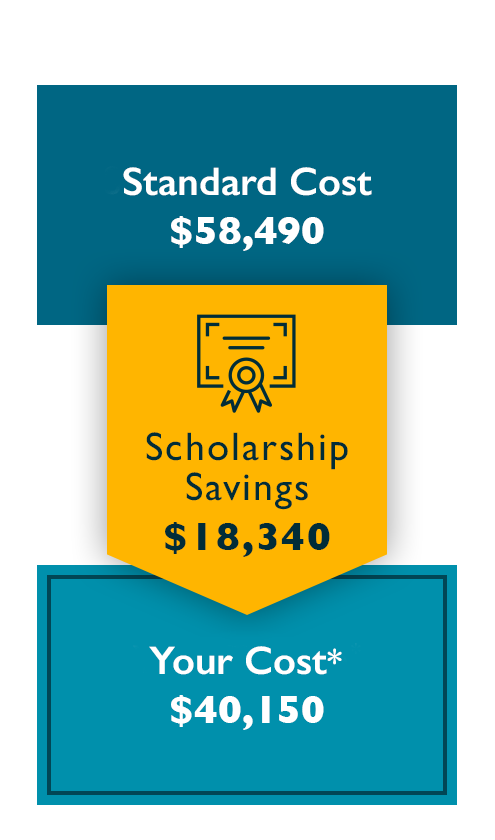Why Choose Walden?
Program Details
Curriculum
Degree Completion Requirements
-
181 quarter credits (35 courses) (1 semester credit equals 1.5 quarter credits)
-
General education courses (56 cr.)
-
Lower level courses (5 cr.)
-
Professional core courses (60 cr.)
-
Elective courses (50 cr.)
-
Demonstration teaching (10 cr.)
-
View the COMPLETE CURRICULUM PLAN
Students may be eligible to transfer up to 105 credits. At least 66 credits must be completed at Walden.
This sequence represents the minimum time to completion. Time to completion will vary by student, depending on individual progress and credits transferred, if applicable. For a personalized estimate of the number of your transfer credits that Walden would accept, call an Enrollment Specialist at 844-765-7831.
Admission Requirements
Admission is considered for adult students who hold a high school diploma or its equivalent. Applicants must also meet one of the following criteria:
- You are 21 years of age or older.
- You are less than 21 years of age with at least 12 quarter credits.
- You are an active member of the military or a veteran with documentation of service.
More information for international applicants.
| Curriculum Component | Requirements | Cost | Amount |
|---|---|---|---|
| Tuition | 136 quarter credit hours | Non-field experience courses: $340 per quarter hour | $46,240 |
| 45 quarter credit hours | Field experience courses: $210 per credit | $9,450 | |
| Total Tuition | $55,690 | ||
| Program Fee | Per quarter | $175 | $2,800 |
| $58,490** | |||
| BELIEVE & ACHIEVE SCHOLARSHIP YOUR TUITION | -$18,340 $40,150* | ||
*Tuition and fees are subject to change. See Tuition and Fees section and Scholarship Details for more information.
**Tuition reflects the minimum time to completion. Time to completion varies by student, depending on individual progress and credits transferred, if applicable. Tuition and time to complete may be reduced if transfer credits are accepted, or if you receive grants, scholarships or other tuition reductions. Walden may accept up to 115 transfer credits. For a personalized estimate of the number of your transfer credits that Walden would accept, call an Enrollment Specialist at 844-768-0109.
Transfer credit total includes reduction in program fee as related to reduced number of courses over time.
Program Outcomes
Build Skills for Licensure and a New Career
Our online bachelor’s in elementary education program will help build your confidence in your teaching skills. To help you prepare for licensure exams, we offer access to our complimentary self-paced test-preparation course, based on game theory. In addition, Walden will pay for your edTPA—a nationally used performance assessment that measures the skills you need as a new teacher.
Career Outlook
As current educators retire, the need for qualified, licensed elementary school teachers is on the rise across the nation.1 According to the U.S. Bureau of Labor Statistics, employment of elementary school teachers (excluding special education) is expected to grow by 4% through 2029.2
The median annual salary in May 2019 for elementary school teachers was $59,670. However, the salary range typically falls between $37,420 and $90,180.2 Salary ranges can vary widely depending on many important factors, including education, certifications, additional skills, the number of years you have spent in your profession.
A BS in Elementary Education can prepare you to pursue career options such as:
-
Elementary school teacher
Career options may require additional experience, training, or other factors beyond the successful completion of this degree program.
A BS in Elementary Education can prepare you to work in settings such as:
-
Public elementary schools
-
Private elementary schools
Learning Outcomes
Graduates of Walden’s online BS in Elementary Education program will be prepared to:
-
Demonstrate content knowledge, skills, and pedagogy appropriate to elementary education.
-
Demonstrate the skills and dispositions of a professional educator.
-
Promote K–6 children’s development and learning across content areas through the design and implementation of engaging, differentiated learning experiences that support children’s development and learning across all domains.
-
Use data to assess student growth to make informed instructional decisions that build on the strengths and meet the needs of individual children.
-
Practice cultural responsiveness to build positive trusting relationships with children, families, and colleagues and to create supportive learning environments for all.
-
Use technology appropriately, resourcefully, and innovatively to personalize and improve teaching and learning.
-
Demonstrate the ability to work collaboratively with children, families, colleagues, and communities to improve outcomes for every child and effect positive social change.
Testimonials
FAQ About Walden’s Online BS in Elementary Education
The Council for the Accreditation of Educator Preparation (CAEP) is a recognized national accreditor for educator preparation and aims to promote excellence through quality assurance and continuous assessment and improvement. The Richard W. Riley College of Education and Human Sciences is accredited by CAEP for a period of seven years, from April 2019 through June 2026. This accreditation covers initial teacher preparation programs and advanced educator preparation programs—including the BS in Elementary Education program. The Riley College of Education and Human Sciences earned CAEP accreditation by meeting rigorous national standards and demonstrating excellence in the areas of content and pedagogy, clinical experiences, selectivity, program impact, and capacity for continuous improvement.
While earning an education degree can be done online or in person at a nearby college, many people are choosing to learn online because of its convenience. When you earn a BS in Elementary Education online, you complete your courses right from home or anywhere else you have internet access. Plus, in some online bachelor’s programs, you can attend class at whatever time of day you want, giving you a lot more control over your daily schedule.
The U.S. Department of Education divides its statistics between pre-kindergarten through eighth grade (grouping those as “elementary school”) and ninth grade through 12th grade (grouping those as “secondary school”). However, most school districts consider kindergarten through fifth or sixth grade to be elementary school and most educational literature and teaching strategies define elementary education within that same K–6 range. In other words, while the statistics for elementary education include middle school, those in the profession use a more selective categorization.
Elementary school is a vital step in preparing children for a lifetime of learning. It’s where most children learn to read, where they learn the fundamental concepts of science and mathematics, and where they gain a basic understanding of the world and its history. Without these critical building blocks, all other learning would be difficult, if not impossible. In fact, studies have shown that early learning can actually increase a student’s lifelong earning potential. In other words, the quality of education a child receives in elementary school can affect his or her entire life.
To become an elementary education teacher, a student can expect to take the following courses:
- Child Development
- Community Building for Effective Classroom Management
- Literacy K–6: Instruction and Assessment
- Mathematics K–6: Instruction and Assessment
- Science K–6: Instruction and Assessment
- Demonstration Teaching/Seminar
While most education degree programs include coursework on teaching strategies, they don’t all prepare you for teacher certification. If you intend to pursue a job as classroom teacher at any level, you’ll need a state-approved teacher preparation program that readies you for the important step of certification.1 While teacher licensure requirements vary by state, most require you to pass one or more skills tests and undergo a background check. Some states may require specific coursework in subjects ranging from history to multiculturalism.
1Source: www.teach.org/becoming-teacher/teaching-certification
A bachelor’s degree in elementary education is the most common degree for elementary school teachers. This degree program will provide you with the knowledge and skills you need to teach students in grades K–6. You will learn about child development, teaching methods, and classroom management. You will also have the opportunity to complete a student teaching experience.
The key steps to becoming an elementary school teacher include:
- Enroll in a quality online bachelor’s or master’s program in education. The curriculum of comprehensive degree programs like an online BS in Elementary Education or Master of Arts in Teaching - Elementary Education should align with the national professional standards of the Council for the Accreditation of Educator Preparation (CAEP) and aim to prepare you for a state teacher licensing exam. Coursework generally covers the fundamentals of teaching general subjects in an elementary classroom setting, and the best degree programs are enhanced with virtual field experiences, field observations, and demonstration teaching.
- Complete your demonstration teaching in an elementary school. Demonstration teaching provides real-world experience and the opportunity to translate theory into practice. During demonstration teaching, teacher candidates also complete the edTPA, a performance-based, subject-specific assessment.
- Take your state’s licensing exam for elementary teachers. Once you have successfully completed your teacher preparation degree program, you will need to pass the standardized testing required by the state in which you plan to teach. Each individual state sets its own standards, so it is important to check with the department of education in your state for details.
- Apply for a certificate from the department of education. Once you have met all the teaching licensure requirements, you need to apply for a certificate from the department of education in your state.
Yes, you can get a teaching license with a bachelor’s degree. Most states require a bachelor’s degree in education or a related field in order to obtain a teaching license. However, some states also allow teachers to earn a teaching license with a bachelor’s degree in another field, as long as they meet the state’s requirements for teacher preparation.
1 Source: Bureau of Labor Statistics, Career Outlook. “How Many Teachers are Leaving.” National job growth estimates may not reflect local and/or short-term economic or job conditions, do not guarantee job growth, and are subject to change.
2 Source: Bureau of Labor Statistics, Occupational Outlook Handbook, Kindergarten and Elementary School Teachers, Job Outlook, Pay. National job growth and salary estimates may not reflect local and/or short-term economic or job conditions, do not guarantee job growth or salaries, and are subject to change.
3Source: Walden University Office of Institutional Research and Assessment (OIRA), as of December 31, 2019.
Accreditation
Walden University’s Richard W. Riley College of Education and Leadership is accredited based on the Council for the Accreditation of Educator Preparation (CAEP) Standards through June 2026. This accreditation covers specific Walden initial teacher and advanced educator preparation programs, including the BS in Elementary Education, Master of Arts in Teaching (MAT) – Special Education specialization, MS in Education – Educational Leadership and Administration specialization, and EdS in Educational Leadership and Administration. The MAT-SPED, MSED-ELA, and EdS-ELA programs were reviewed by Specialized Professional Associations (SPAs), which define content-area standards for programs, and achieved national recognition.
CAEP promotes excellence in educator preparation through quality assurance and continuous improvement. Walden’s College of Education and Leadership has earned national accreditation by demonstrating excellence in the areas of content and pedagogy, clinical experiences, selectivity, program impact, and capacity for continuous improvement. CAEP is a Council for Higher Education Accreditation (CHEA) – recognized national accreditor for educator preparation.
Licensure
Walden is approved by the Minnesota Professional Educator Licensing and Standards Board (PELSB) to offer a program leading to a Minnesota Tier 3 license in Elementary Education. Candidates seeking licensure in Minnesota are responsible for completing all Minnesota requirements beyond Walden’s state-approved program, including passing the Minnesota Teacher Licensure Exams. The Minnesota Professional Educator Licensing and Standards Board (PELSB) is solely responsible for reviewing applications and issuing licenses.
Individuals interested in licensure in states other than Minnesota may qualify by virtue of completing a state-approved educator preparation program; however, individuals must review their state’s regulations to ensure the program meets all requirements, paying particular attention to any requirements specific to out-of-state program completers. Individuals who reside in certain states may be ineligible to enroll in this program. Walden Enrollment Specialists can provide guidance on licensure questions; however, it remains the individual’s responsibility to understand and comply with all state licensure requirements. Walden makes no representation or guarantee that completion of Walden coursework or programs will permit an individual to obtain state licensure.













